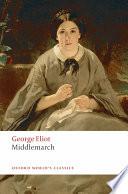Quotes from book
Middlemarch

Middlemarch, A Study of Provincial Life is a novel by the English author George Eliot , appearing in eight instalments in 1871 and 1872. Set in a fictitious Midlands town from 1829 to 1832, it follows distinct, intersecting stories with many characters. Issues include the status of women, the nature of marriage, idealism, self-interest, religion, hypocrisy, political reform, and education. Despite comic elements, Middlemarch uses realism to encompass historical events: the 1832 Reform Act, early railways, and the succession of King William IV. It views contemporary medicine and examines reactionary views in a settled community facing unwelcome change. Eliot began writing the two pieces that would form the novel in 1869–1870 and completed it in 1871. Initial reviews were mixed, but it is now seen widely as her best work and one of the great novels in English.

“Every limit is a beginning as well as an ending.”
Source: Middlemarch (1871)
Context: Every limit is a beginning as well as an ending. Who can quit young lives after being long in company with them, and not desire to know what befell them in their after-years? For the fragment of a life, however typical, is not the sample of an even web: promises may not be kept, and an ardent outset may be followed by declension; latent powers may find their long-waited opportunity; a past error may urge a grand retrieval.

“People are almost always better than their neighbors think they are.”
Source: Middlemarch

“Destiny stands by sarcastic with our dramatis personae folded in her hand.”
Source: Middlemarch

“And, of course men know best about everything, except what women know better.”
Source: Middlemarch

“It is a narrow mind which cannot look at a subject from various points of view.”
Source: Middlemarch

“The troublesome ones in a family are usually either the wits or the idiots.”
Source: Middlemarch